#Automated Expense Reporting Software
Explore tagged Tumblr posts
Text
ExpenseVisor: Simplify Expense Management with Automation
Transform your expense management process with Automated Expense Reporting Software from ExpenseVisor. Say goodbye to manual errors and inefficiencies as you leverage ExpenseVisor smart solutions to track, submit, and review expenses seamlessly, ensuring compliance and precision in every report.
#expense reporting solutions#automated expense reporting#business expense management tool#corporate expense tracking#expense management tool#smart expense management#expense management software#Automated Expense Reporting Software
0 notes
Text
Simplify Client Management with AI
Expedite client book reviews effortlessly with Docyt Copilot, one stop Solution for accounting Assessment and Audit. Start a free trial today!" For more information click here: https://docyt.com/docyt-copilot/
#financial reporting software#expense management software#accounting workflow software#accounts payable automation#accounts payable automation software#accounts payable software for small business#bookkeeping services for business#bookkeeping software for accountants#bookkeeping software for accounting firms#business bookkeeping software#employee expense report#expense management solutions#expense reimbursement report.
0 notes
Text
How to Choose the Best Accounting Software for Your Business
Introduction In the fast-moving environment related to the business world, keeping yourself on top of the finances will never be an easy task. In reality, a company can easily slip into disarray without proper supervision of its finances. No matter whether yours is a small startup or a big corporation, the right kind of accounting software will certainly work wonders in the smooth flow of financial operations. But with accounting software options galore, how do you choose a software that’s suitable for your business? The guide from TechtoIO will take you through everything you need to know to make an informed decision. Read to continue
#analysis#science updates#tech news#trends#adobe cloud#nvidia drive#science#business tech#technology#tech trends#CategoriesSoftware Solutions#Tagsaccounting software comparison#AI in accounting software#automated invoicing software#best accounting software for business#blockchain accounting solutions#choosing accounting software#cloud-based accounting software#expense tracking software#financial reporting tools#FreshBooks review#integrating accounting software#mobile accounting software#QuickBooks vs Xero#scalable accounting software#secure accounting software#small business accounting software#top accounting software 2024#user-friendly accounting software#Wave accounting software
0 notes
Text
Taking Expense Management to the Next Level with ExpenseVisor in Charlotte, NC
Being a business owner in Charlotte, North Carolina, managing expenses can be a challenge. Whether you are managing cash advances, tracking employee spending, or allocating budgeted funds, it can be difficult to stay organized. With the right tools and software solutions, however, keeping your finances in order and on track is easier than ever.
This is where ExpenseVisor, an Online Expense Management Service in Charlotte NC, comes in. ExpenseVisor is a comprehensive, easy-to-use Expense Management Application in Charlotte NC that allows you to easily track and manage all of your financial data in real-time.
With ExpenseVisor, business owners in Charlotte can easily view and manage their financial data. The software gives you an overview of all of your expenses and provides tools and analytics to help you identify trends and opportunities to reduce costs and improve efficiency. It also provides powerful reporting features that allow you to quickly generate reports on spending, budgeting, and other financial data.

The software also provides a secure, mobile-friendly log in experience that allows you to easily access your financial data on the go. Whether you're in your office or out of town, you can easily monitor your finances from your mobile device. And with its intuitive design, you can quickly add new expenses, approve payments, and check account balances without ever leaving the app.
In addition to the convenience of managing your finances from any device, ExpenseVisor also helps business owners in Charlotte save time and money. With its automated expense tracking, you can quickly set up rules and parameters based on your business’s needs, allowing you to easily and accurately track employee spending. It also gives you the ability to set up spending limits and view spending trends, making it easier to allocate budgeted funds and maximize savings.
By providing an easy-to-use, secure Online Expenses Software System in Charlotte NC, ExpenseVisor gives business owners in Charlotte the tools and insights they need to stay organized and save time and money. With its comprehensive reports, intuitive design, and automated expense tracking capabilities, ExpenseVisor helps you take control of your financial data and make informed decisions to improve your business. For more information call us at +1 704 644 0019 or visit us at:- https://expensevisor.com/
#Automate Travel Expense Reports Charlotte NC#Automated Expense Report Software Charlotte NC#Business Expense Report Charlotte NC#Business Expense Report Software Charlotte NC#Business Travel Expense Management Software Charlotte NC#Business Travel Expense Report Charlotte NC
0 notes
Text
https://www.itilite.com/blog/why-you-need-expense-management-automation/
Expense Management Automation: Why do you Need an Automated Expense Management System?
0 notes
Note
Hey! This is very random, but I saw that you work in cyber security right now. I work in data science, but I'm really interested in cyber security and considering making a switch. I was wondering what kind of cybersecurity work you do, and what has been the most helpful for you to learn what you need for your job!
Hi! Cybersecurity is a really broad field, and you can do a lot of different things depending on what your interests are.
My work is mostly focused around automating things for security, since my background is in programming. Automation is really helpful for speeding up boring, monotonous tasks that need to get done, but don't necessarily need a human involved. A good example is automated phishing analysis, since phishing reports are a big chunk of the cases that security analysts have to deal with, and an analyst usually follows the same few steps at the beginning. Rather than someone having to manually check the reputation of the sender domain, check the reputation of any links, and all of that every single time, we can build tools to automatically scan for things like that and then present the info to the analyst. The whole idea here is to automate the boring data retrieval stuff, since computers are good at that, and give the analyst more time for decision-making and analysis, since humans are good at that.
If you're coming from data science, you might be interested in detection engineering. Cybersecurity is essentially a data problem - we have a ton of logs from a ton of different sources (internal logs, threat intelligence feeds, etc.) - how do we sort through that data to highlight things that we want to pay attention to, and how can we correlate events from different sources? If you're into software development or want to stay more on the data science side, maybe you could also look into roles for software development at companies that have SIEM (Security Information and Event Management) products - these are essentially the big log repositories that organizations rely on for correlation and alerting.
As for starting to learn security, my general go-to recommendation is to start looking through the material for the Security+ certification. For better or worse, certifications are pretty big in security, much more so than other tech fields (to my knowledge). I'm a bit more hesitant to recommend the Security+ now, since CompTIA (the company that offers it) was bought by a private equity company last year. Everyone is kind of expecting the prices to go up and the quality to go down. (The Security+ exam costs $404 USD as of writing this, and I think I took mine for like $135ish with a student discount in 2022). However, the Security+ is still the most well-known and comprehensive entry-level certification that I'm aware of. You can (and should) study for it completely for free - check out Professor Messer's training videos on YouTube. There are also plenty of books out there if that's more of your thing. I'd say to treat the Security+ as a way to get a broad overview of security and figure out what you don't know. (It's certainly not a magic ticket to a job, no matter what those expensive bootcamps will tell you.)
If you aren't familiar with networking, it's worth checking out Professor Messer's Network+ training videos as well. You don't need to know everything on there, but having an understanding of ports, protocols, and network components and design is super useful. I hear a lot that the best security folks are often the ones who come from IT or networking or similar and have a really solid understanding of the fundamentals and then get into security. Don't neglect the basics!
One thing that I'll also add, based on conversations I've had with folks in my network… getting a job in cybersecurity is harder now than it used to be, at least in the US (where I am). There are a ton of very well-qualified people who have been laid off who are now competing with people trying to get into the field in the first place, and with the wrecking ball that Elon is taking to the federal government (and by extension, government contractors) right now… it's hard. There's still a need for skilled folks in cyber, but you're going to run into a lot of those "5 years of experience required for this entry-level job" kind of job postings.
On a slightly happier note, another thing you should do if you want to get into cyber is to stay up to date with what's happening in the industry! I have a masterpost that has a section with some of my favorite news sources. The SANS Stormcast is a good place to start - it's a 5 minute podcast every weekday morning that covers most of the big things. Black Hills Infosec also does a weekly news livestream on YouTube that's similar (but longer and with more banter). Also, a lot of infosec folks hang out on Mastodon & in the wider fediverse. Let me know if you want some recs for folks to follow over there.
The nice thing about cybersecurity (and computer-related fields in general, I find) is that there are a ton of free resources out there to help you learn. Sometimes it's harder to find the higher-quality ones, but let me know if there are any topics you're interested in & I'll see what I can find. I have a few posts in my cybersecurity tag on here that might help.
Thank you for your patience, I know you sent this in over a week ago lol but life has been busy. Feel free to send any follow-up questions if you have any!
10 notes
·
View notes
Text
Weaponizing violence. With alarming regularity, the nation continues to be subjected to spates of violence that terrorizes the public, destabilizes the country’s ecosystem, and gives the government greater justifications to crack down, lock down, and institute even more authoritarian policies for the so-called sake of national security without many objections from the citizenry.
Weaponizing surveillance, pre-crime and pre-thought campaigns. Surveillance, digital stalking and the data mining of the American people add up to a society in which there’s little room for indiscretions, imperfections, or acts of independence. When the government sees all and knows all and has an abundance of laws to render even the most seemingly upstanding citizen a criminal and lawbreaker, then the old adage that you’ve got nothing to worry about if you’ve got nothing to hide no longer applies. Add pre-crime programs into the mix with government agencies and corporations working in tandem to determine who is a potential danger and spin a sticky spider-web of threat assessments, behavioral sensing warnings, flagged “words,” and “suspicious” activity reports using automated eyes and ears, social media, behavior sensing software, and citizen spies, and you having the makings for a perfect dystopian nightmare. The government’s war on crime has now veered into the realm of social media and technological entrapment, with government agents adopting fake social media identities and AI-created profile pictures in order to surveil, target and capture potential suspects.
Weaponizing digital currencies, social media scores and censorship. Tech giants, working with the government, have been meting out their own version of social justice by way of digital tyranny and corporate censorship, muzzling whomever they want, whenever they want, on whatever pretext they want in the absence of any real due process, review or appeal. Unfortunately, digital censorship is just the beginning. Digital currencies (which can be used as “a tool for government surveillance of citizens and control over their financial transactions”), combined with social media scores and surveillance capitalism create a litmus test to determine who is worthy enough to be part of society and punish individuals for moral lapses and social transgressions (and reward them for adhering to government-sanctioned behavior). In China, millions of individuals and businesses, blacklisted as “unworthy” based on social media credit scores that grade them based on whether they are “good” citizens, have been banned from accessing financial markets, buying real estate or travelling by air or train.
Weaponizing compliance. Even the most well-intentioned government law or program can be—and has been—perverted, corrupted and used to advance illegitimate purposes once profit and power are added to the equation. The war on terror, the war on drugs, the war on COVID-19, the war on illegal immigration, asset forfeiture schemes, road safety schemes, school safety schemes, eminent domain: all of these programs started out as legitimate responses to pressing concerns and have since become weapons of compliance and control in the police state’s hands.
Weaponizing entertainment. For the past century, the Department of Defense’s Entertainment Media Office has provided Hollywood with equipment, personnel and technical expertise at taxpayer expense. In exchange, the military industrial complex has gotten a starring role in such blockbusters as Top Gun and its rebooted sequel Top Gun: Maverick, which translates to free advertising for the war hawks, recruitment of foot soldiers for the military empire, patriotic fervor by the taxpayers who have to foot the bill for the nation’s endless wars, and Hollywood visionaries working to churn out dystopian thrillers that make the war machine appear relevant, heroic and necessary. As Elmer Davis, a CBS broadcaster who was appointed the head of the Office of War Information, observed, “The easiest way to inject a propaganda idea into most people’s minds is to let it go through the medium of an entertainment picture when they do not realize that they are being propagandized.”
Weaponizing behavioral science and nudging. Apart from the overt dangers posed by a government that feels justified and empowered to spy on its people and use its ever-expanding arsenal of weapons and technology to monitor and control them, there’s also the covert dangers associated with a government empowered to use these same technologies to influence behaviors en masse and control the populace. In fact, it was President Obama who issued an executive order directing federal agencies to use “behavioral science” methods to minimize bureaucracy and influence the way people respond to government programs. It’s a short hop, skip and a jump from a behavioral program that tries to influence how people respond to paperwork to a government program that tries to shape the public’s views about other, more consequential matters. Thus, increasingly, governments around the world—including in the United States—are relying on “nudge units” to steer citizens in the direction the powers-that-be want them to go, while preserving the appearance of free will.
Weaponizing desensitization campaigns aimed at lulling us into a false sense of security. The events of recent years—the invasive surveillance, the extremism reports, the civil unrest, the protests, the shootings, the bombings, the military exercises and active shooter drills, the lockdowns, the color-coded alerts and threat assessments, the fusion centers, the transformation of local police into extensions of the military, the distribution of military equipment and weapons to local police forces, the government databases containing the names of dissidents and potential troublemakers—have conspired to acclimate the populace to accept a police state willingly, even gratefully.
Weaponizing fear and paranoia. The language of fear is spoken effectively by politicians on both sides of the aisle, shouted by media pundits from their cable TV pulpits, marketed by corporations, and codified into bureaucratic laws that do little to make our lives safer or more secure. Fear, as history shows, is the method most often used by politicians to increase the power of government and control a populace, dividing the people into factions, and persuading them to see each other as the enemy. This Machiavellian scheme has so ensnared the nation that few Americans even realize they are being manipulated into adopting an “us” against “them” mindset. Instead, fueled with fear and loathing for phantom opponents, they agree to pour millions of dollars and resources into political elections, militarized police, spy technology and endless wars, hoping for a guarantee of safety that never comes. All the while, those in power—bought and paid for by lobbyists and corporations—move their costly agendas forward, and “we the suckers” get saddled with the tax bills and subjected to pat downs, police raids and round-the-clock surveillance.
Weaponizing genetics. Not only does fear grease the wheels of the transition to fascism by cultivating fearful, controlled, pacified, cowed citizens, but it also embeds itself in our very DNA so that we pass on our fear and compliance to our offspring. It’s called epigenetic inheritance, the transmission through DNA of traumatic experiences. For example, neuroscientists observed that fear can travel through generations of mice DNA. As The Washington Post reports, “Studies on humans suggest that children and grandchildren may have felt the epigenetic impact of such traumatic events such as famine, the Holocaust and the Sept. 11, 2001, terrorist attacks.”
Weaponizing the future. With greater frequency, the government has been issuing warnings about the dire need to prepare for the dystopian future that awaits us. For instance, the Pentagon training video, “Megacities: Urban Future, the Emerging Complexity,” predicts that by 2030 (coincidentally, the same year that society begins to achieve singularity with the metaverse) the military would be called on to use armed forces to solve future domestic political and social problems. What they’re really talking about is martial law, packaged as a well-meaning and overriding concern for the nation’s security. The chilling five-minute training video paints an ominous picture of the future bedeviled by “criminal networks,” “substandard infrastructure,” “religious and ethnic tensions,” “impoverishment, slums,” “open landfills, over-burdened sewers,” a “growing mass of unemployed,” and an urban landscape in which the prosperous economic elite must be protected from the impoverishment of the have nots. “We the people” are the have-nots.
The end goal of these mind control campaigns—packaged in the guise of the greater good—is to see how far the American people will allow the government to go in re-shaping the country in the image of a totalitarian police state.
11 notes
·
View notes
Text
The Power of Upskilling: Why Investing in Yourself Is the Smartest Move You’ll Ever Make
In today’s fast-paced, constantly evolving world, the only thing more expensive than investing in yourself is not doing it.
Upskilling — the process of learning new skills or enhancing existing ones — is no longer optional. It's a necessity for staying competitive in the workforce, pivoting to new career paths, and adapting to a world where change is the only constant.
Whether you're a fresh graduate, a mid-career professional, or a business leader, this post will help you understand why upskilling matters, where to start, and how to make learning a lifelong habit.
Why Upskilling Matters More Than Ever
1. Rapid Technological Advancements
Automation, AI, and digital transformation have reshaped industries. According to the World Economic Forum, 44% of workers’ core skills will change by 2027. Skills that were in high demand five years ago may now be outdated.
Jobs aren't necessarily disappearing — they’re evolving. That means individuals must continuously adapt or risk being left behind.
2. Career Growth and Mobility
Upskilling doesn’t just help you survive — it helps you thrive.
Want a promotion? Looking to switch industries? Trying to freelance or start a side hustle? Upskilling bridges the gap between where you are and where you want to be.
For example:
A marketer who learns data analytics becomes more valuable.
A teacher who gains expertise in EdTech can unlock new career opportunities.
A finance professional with coding skills can transition into fintech.
3. Increased Job Security
In uncertain economic times, employees with in-demand skills are often the last to go. Upskilling makes you indispensable. Employers view proactive learners as assets — people who are flexible, forward-thinking, and ready to take on new challenges.
4. Personal Satisfaction and Confidence
Beyond career advantages, learning something new boosts your self-esteem. Mastering a new tool or concept builds confidence and adds a sense of achievement. Lifelong learning is directly linked to better mental health, cognitive ability, and even happiness.
Identifying What to Learn
Not all skills are created equal. Here’s how to identify what you should focus on:
1. Align With Industry Trends
Start by researching current trends in your field. What tools, software, or certifications are becoming standard? Websites like LinkedIn Learning, Coursera, and even job boards can offer insight into what’s in demand.
2. Pinpoint Skill Gaps
Look at your resume, job performance, or feedback. Are there areas where you consistently feel underqualified or reliant on others? That’s your starting point.
For instance, if you’re in marketing but struggle with Excel or Google Analytics, that’s a practical gap to close.
3. Balance Hard and Soft Skills
Hard skills (e.g., coding, SEO, data visualization) are measurable and job-specific. Soft skills (e.g., communication, emotional intelligence, adaptability) are often what make or break long-term success.
According to LinkedIn’s Workplace Learning Report, soft skills like creativity, collaboration, and critical thinking are increasingly valued by employers.
How to Upskill Effectively
Upskilling doesn’t have to mean going back to college or spending thousands. With the right strategy, you can learn faster, smarter, and more sustainably.
1. Set Clear Goals
Vague intentions (“I want to get better at digital marketing”) rarely produce results. Instead, try: ✅ “I will complete a Google Ads certification within 30 days.” ✅ “I will write one blog post a week to practice content writing.”
2. Use Online Platforms
Some great learning platforms include:
Coursera – Offers university-led courses, many for free.
Udemy – Affordable, practical skill-based learning.
LinkedIn Learning – Career-focused, bite-sized lessons.
edX – Ivy-league content in flexible formats.
YouTube – A goldmine for free tutorials.
Don’t forget podcasts, newsletters, webinars, and even TikTok or Instagram accounts focused on education.
3. Apply What You Learn
Knowledge without application is wasted. If you’re learning copywriting, start a blog. If you’re learning a coding language, build a small project. Application cements learning and gives you portfolio pieces to show potential employers.
4. Join a Community
Learning with others keeps you accountable. Join Slack groups, Reddit communities, Discord servers, or local meetups. Networking with people on the same journey also opens up career opportunities.
5. Track and Reflect
Keep a simple progress log. Write down what you learned each week, what worked, and what didn’t. Reflection helps identify plateaus and gives you clarity on your next steps.
Upskilling at Work: Make It a Two-Way Street
If you’re employed, your workplace may be willing to sponsor courses or give you dedicated learning hours. Upskilling benefits your employer too — so don’t hesitate to ask.
Here’s how:
Propose a specific course or certification.
Explain how it’ll improve your job performance.
Offer to train others on what you’ve learned.
Employers appreciate initiative and are often happy to invest in employees who invest in themselves.
Final Thoughts: Build a Habit, Not Just a Skill
The most successful people don’t upskill once — they build a habit of learning.
Start with 30 minutes a day. Read a chapter. Watch a tutorial. Experiment with a new tool. Upskilling isn’t a race; it’s a lifestyle.
Remember: your career is your responsibility. In a world where industries change overnight, the most future-proof investment isn’t in stocks or crypto — it’s in you.
2 notes
·
View notes
Text
Why Payroll Outsourcing in Delhi is Essential for Business Efficiency

Streamline Your Business with Payroll Outsourcing in Delhi
As businesses expand and compliance regulations become more demanding, many organizations are now turning to payroll outsourcing in Delhi to simplify their internal operations. Managing payroll in-house can be tedious, especially when dealing with frequent legal updates, tax deductions, and employee benefits. Outsourcing this function not only ensures accuracy but also provides companies the freedom to focus on core business activities.
What is Payroll Outsourcing?
Payroll outsourcing is the process of hiring an external service provider to manage a company's entire payroll system. This includes calculating employee salaries, processing tax filings, managing provident fund (PF) and employee state insurance (ESI) contributions, generating payslips, and ensuring legal compliance. For businesses in Delhi—a city teeming with startups, SMEs, and large enterprises—this approach has become a practical necessity.
Benefits of Payroll Outsourcing
1. Cost and Time Efficiency Managing payroll internally can consume significant time and resources. With outsourcing, companies save on the cost of hiring specialized staff or purchasing expensive payroll software. It also eliminates the need for constant training to stay up-to-date with changing laws.
2. Regulatory Compliance Indian payroll laws are complex and ever-evolving. From income tax rules to statutory deductions like PF, ESI, and gratuity, compliance is critical to avoid penalties. A payroll outsourcing provider in Delhi ensures all calculations and filings are handled accurately and on time.
3. Enhanced Accuracy Manual payroll processing can lead to errors in salary calculations or tax filings. With automated systems and expert oversight, outsourced payroll services offer greater accuracy and reliability, reducing the chances of employee dissatisfaction or legal issues.
4. Data Security and Confidentiality Reputable payroll outsourcing firms use secure, cloud-based systems with encryption to protect sensitive employee data. This minimizes the risk of data breaches and ensures confidentiality is maintained at all times.
5. Scalability and Flexibility As your workforce grows or contracts, outsourcing partners can easily scale their services to match your needs. Whether you’re hiring 10 or 100 new employees, your payroll operations remain smooth and efficient.
Services Included in Payroll Outsourcing
Most payroll outsourcing providers in Delhi offer comprehensive solutions that include:
Monthly salary processing and disbursement
Payslip generation and distribution
Tax deductions and filings (TDS, PF, ESI, etc.)
Year-end tax form preparation (Form 16)
Compliance with labor laws and statutory reporting
Attendance and leave management integration
Reimbursement and bonus management
Employee helpdesk support for payroll queries
Advanced service providers may also offer integration with HR software, mobile apps for employees, and dashboards for real-time payroll analytics.
Why Delhi-Based Companies Should Consider Payroll Outsourcing
Delhi is a highly competitive and regulatory-sensitive business environment. Companies in this region must be agile and compliant while controlling costs. Payroll outsourcing is especially beneficial here because local providers have expertise in regional labor rules, state-specific regulations, and offer fast turnaround times for urgent payroll processing needs.
Additionally, Delhi is home to a wide pool of professional payroll service providers who offer tailored solutions for different industries—from IT and education to manufacturing and healthcare.
Choosing the Right Payroll Partner
Before selecting a payroll outsourcing company in Delhi, consider the following:
Experience and Reputation: Look for a provider with proven experience and client testimonials.
Technology Platform: Ensure they use a secure, modern payroll system.
Compliance Knowledge: They should stay updated with the latest changes in tax and labor laws.
Customization Options: Your business may have unique payroll structures or benefits.
Customer Support: Timely and responsive communication is essential for resolving issues quickly.
Final Thoughts
In a fast-moving market like Delhi, where talent retention, compliance, and cost control are key concerns, outsourcing payroll can offer a significant competitive advantage. It streamlines processes, ensures accuracy, and reduces operational stress—allowing companies to concentrate on strategic goals.
Whether you're a small business owner or the HR head of a growing enterprise, payroll outsourcing in Delhi could be the smartest step you take this year toward efficiency and peace of mind.
3 notes
·
View notes
Text
How Do I Choose Best expense management software for small business ?
Every small business has its inspiring challenges, but perhaps most challenging is the management of expenses. It means every rupee counts, and every penny that is withheld is between profit and loss. All these reasons make an appropriate decision in choosing the best expense management software for small business not just an idea-good but critical.
Again, there are too many tools available, so how does one know the right one for him or her? This article will chop through all such questions into components required to check out, comparing options with other people, and why the right software may change the management of your business.
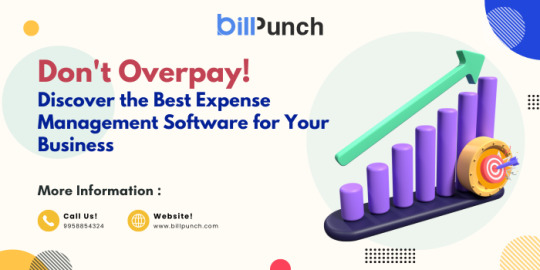
Why Do You Need Expense Management Software ?
If your business is growing, so is the complexity related to your receipts, travel expenses, reimbursements, and even the company spending by the team. It's tedious to manually enclose this information into spreadsheets; in addition, the process is quite error-prone and delays occur.
That's where the best expense management software for small businesses comes in. It automates, keeps your finances sorted, and gives you a real-time view of where the money is going. Whether it is day-by-day purchases or your monthly bills or even employee reimbursements, a good tool can turn things around all the way.
Essential Features You Should Look For in Best Expense Management Software that Suits Small Businesses
1. Usability
You need software that is intuitive and user-friendly. It should also be feature-rich and seamless when it comes to onboarding. Often, small businesses do not have dedicated IT teams, qualified individuals or resources to be able to deploy specialized software easily by an expert.
2. Automated and Integrated
The best software in this regard should also go further by automating all areas related to income and expenses, including the accounting tools involved, banks, and by supplementing with HR platforms. Applicants should take onboard, for example, automated expense capture as a recurrence and categorization.
3. Customizable Reporting
Good detailed reports facilitate spending trend analysis. Customizable reports are a basic need, be it a small business expense report software for sharing with your accountant or receiving insights for budget optimization.
4. Travel and Absence Management
If the workforce is going to take trips on a company basis, invest in a good travel management system that would have a good module for absence management, hence making things simple from booking to reimbursement to leave approvals.
5. Performance and HR Integration
Household expenses management tools now provide those in-house HR management, performance management systems, and other HR-related utilities as extensions of usage. All the above has made it very convenient for both HR and finance.
Seeking the Best Digitalization Benefits
Changing from manual processes to the best software for tracking revenues and expenditures brings quite a few advantages:
for example, time savings in approvals and reimbursements, less paperwork and reduced administration, visibility into spending by the team and department; guarantee policy compliance and the elimination of fraud risks, and real-time improvements in budgeting.
Bringings along small business expense report software, and preparing clearwashed, very professional reports for investors, partners or accountants can be accomplished in just a few clicks.
Conclusion
The best expense management software for small business, look for one that will simplify workflows, save time, minimize the human error, and grow with you.
If that seems hard to get, though, BillPunch makes all these things—and more—affordable and very user-friendly. So if you're looking for the best in travel management software or absence management software, or wish to know the best income and expense-tracking software in one, BillPunch surely covers it.
Ready to Simplify Your Business Finances ?
Allow BillPunch to take the pain out of expense tracking; automate your financial workflows, integrate with your HR tools, and get real-time control of your business spend-all on one platform.
#hr management#hr software#hris system#911 abc#arcane#artists on tumblr#batman#cats of tumblr#cookie run kingdom#elon musk
2 notes
·
View notes
Text
ExpenseVisor: Advanced Automated Expense Reporting Software for Businesses
Take control of your expenses with ExpenseVisor, an innovative Automated Expense Reporting Software offering accuracy, efficiency, and real-time insights.
#Expense Management Tool#Automated expense reporting#Corporate expense tracking#Business expense management tool#Expense reporting solutions#Smart expense management#Automated Expense Reporting Software
0 notes
Text
AI-powered Accounting Automation and Bookkeeping Platform
"Docyt 360 AI-powered Accounting Automation platform automates bookkeeping and delivers live financial insights to keep you ahead of the game.For more details click here: https://docyt.com/docyt-ai-accounting-automation-software/
#expense reimbursement report#financial bookkeeping software#financial reporting services#financial reporting tools#franchise reporting#restaurant bookkeeping#restaurant bookkeeping services#retail bookkeeping#revenue recognition automation.
0 notes
Text
The Role of Cloud-Based Accounting in Enhancing Small Business Efficiency
In today's fast-paced business environment, cloud-based accounting has become a game-changer for small businesses. It offers real-time financial insights, seamless collaboration, and cost-effective solutions, enabling businesses to optimize their financial operations. As small businesses strive to remain competitive, partnering with a reliable Chartered Accountants Firm like Accounting Lane can help streamline their accounting processes and improve financial decision-making.

Why Cloud-Based Accounting?
Cloud-based accounting provides businesses with a secure, scalable, and efficient way to manage financial data. Unlike traditional accounting methods, cloud-based solutions allow business owners and accountants to access financial records anytime, anywhere. This flexibility ensures that businesses can respond swiftly to financial challenges and opportunities.
Key benefits of cloud-based accounting include:
Real-Time Financial Monitoring – Businesses can track their financial performance in real-time, making it easier to manage cash flow and expenses.
Cost Efficiency – By eliminating the need for expensive hardware and IT infrastructure, businesses can significantly reduce operational costs.
Automation of Repetitive Tasks – Cloud-based accounting software automates invoicing, payroll, and tax calculations, reducing human errors and saving valuable time.
Enhanced Security – Data stored in the cloud is encrypted and backed up, ensuring protection against cyber threats and data loss.
Seamless Collaboration – Multiple users can access financial records simultaneously, enabling efficient teamwork between business owners and accountants.
Enhancing Small Business Efficiency with Cloud-Based Accounting
Small businesses often face resource constraints and financial complexities. Cloud-based Accounting Services For Small Business help simplify financial management by providing accurate, up-to-date reports that aid in strategic decision-making.
By outsourcing bookkeeping and financial reporting to an expert Chartered Accountants Firm, businesses can focus on growth and core operations. Firms like Accounting Lane specialize in providing tailored accounting solutions that ensure compliance, optimize tax planning, and enhance financial efficiency.
How Cloud-Based Accounting Supports Business Growth
Improved Cash Flow Management – Cloud solutions offer real-time cash flow tracking, helping businesses maintain liquidity and plan future investments.
Regulatory Compliance – Cloud accounting platforms are regularly updated to comply with financial regulations, reducing the risk of legal issues.
Data-Driven Decision Making – Business owners can leverage real-time financial insights to make informed strategic decisions.
Scalability – As businesses grow, cloud-based accounting solutions can scale to accommodate increasing financial transactions and reporting needs.
Choosing the Right Accounting Partner
A reputable Chartered Accountants Firm like Accounting Lane plays a crucial role in helping small businesses implement and manage cloud-based accounting. Their expertise ensures accurate financial reporting, regulatory compliance, and efficient tax planning, allowing businesses to operate smoothly without financial hurdles.
By leveraging Accounting Services for Small Business, companies can save time, reduce costs, and improve financial transparency. Cloud-based accounting is not just a trend—it is the future of financial management, ensuring that small businesses stay agile, competitive, and prepared for long-term success.
2 notes
·
View notes
Text
Benefits Of Conversational AI & How It Works With Examples
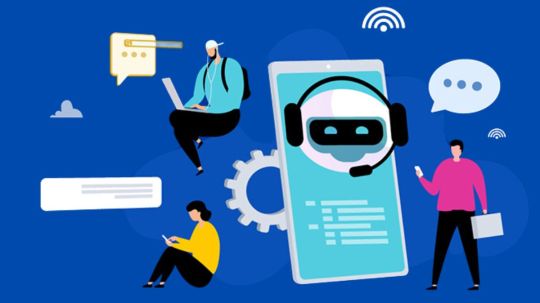
What Is Conversational AI?
Conversational AI mimics human speech. It’s made possible by Google’s foundation models, which underlie new generative AI capabilities, and NLP, which helps computers understand and interpret human language.
How Conversational AI works
Natural language processing (NLP), foundation models, and machine learning (ML) are all used in conversational AI.
Large volumes of speech and text data are used to train conversational AI systems. The machine is trained to comprehend and analyze human language using this data. The machine then engages in normal human interaction using this information. Over time, it improves the quality of its responses by continuously learning from its interactions.
Conversational AI For Customer Service
With IBM Watsonx Assistant, a next-generation conversational AI solution, anyone in your company can easily create generative AI assistants that provide customers with frictionless self-service experiences across all devices and channels, increase employee productivity, and expand your company.
User-friendly: Easy-to-use UI including pre-made themes and a drag-and-drop chat builder.
Out-of-the-box: Unconventional To better comprehend the context of each natural language communication, use large language models, large speech models, intelligent context gathering, and natural language processing and understanding (NLP, NLU).
Retrieval-augmented generation (RAG): It based on your company’s knowledge base, provides conversational responses that are correct, relevant, and current at all times.
Use cases
Watsonx Assistant may be easily set up to accommodate your department’s unique requirements.
Customer service
Strong client support With quick and precise responses, chatbots boost sales while saving contact center funds.
Human resources
All of your employees may save time and have a better work experience with HR automation. Questions can be answered by staff members at any time.
Marketing
With quick, individualized customer service, powerful AI chatbot marketing software lets you increase lead generation and enhance client experiences.
Features
Examine ways to increase production, enhance customer communications, and increase your bottom line.
Artificial Intelligence
Strong Watsonx Large Language Models (LLMs) that are tailored for specific commercial applications.
The Visual Builder
Building generative AI assistants using to user-friendly interface doesn’t require any coding knowledge.
Integrations
Pre-established links with a large number of channels, third-party apps, and corporate systems.
Security
Additional protection to prevent hackers and improper use of consumer information.
Analytics
Comprehensive reports and a strong analytics dashboard to monitor the effectiveness of conversations.
Self-service accessibility
For a consistent client experience, intelligent virtual assistants offer self-service responses and activities during off-peak hours.
Benfits of Conversational AI
Automation may save expenses while boosting output and operational effectiveness.
Conversational AI, for instance, may minimize human error and expenses by automating operations that are presently completed by people. Increase client happiness and engagement by providing a better customer experience.
Conversational AI, for instance, may offer a more engaging and customized experience by remembering client preferences and assisting consumers around-the-clock when human agents are not present.
Conversational AI Examples
Here are some instances of conversational AI technology in action:
Virtual agents that employ generative AI to support voice or text conversations are known as generative AI agents.
Chatbots are frequently utilized in customer care applications to respond to inquiries and offer assistance.
Virtual assistants are frequently voice-activated and compatible with smart speakers and mobile devices.
Software that converts text to speech is used to produce spoken instructions or audiobooks.
Software for speech recognition is used to transcribe phone conversations, lectures, subtitles, and more.
Applications Of Conversational AI
Customer service: Virtual assistants and chatbots may solve problems, respond to frequently asked questions, and offer product details.
E-commerce: Chatbots driven by AI can help customers make judgments about what to buy and propose products.
Healthcare: Virtual health assistants are able to make appointments, check patient health, and offer medical advice.
Education: AI-powered tutors may respond to student inquiries and offer individualized learning experiences.
In summary
The way to communicate with robots might be completely changed by the formidable technology known as conversational AI. Also can use its potential to produce more effective, interesting, and customized experiences if it comprehend its essential elements, advantages, and uses.
Read more on Govindhech.com
#ConversationalAI#AI#NLP#machinelearning#generativeAI#LLM#AIchatbot#News#Technews#Technology#Technologynews#Technologytrends#Govindhtech
3 notes
·
View notes
Text
Automated Software: The Answer to Easy Expense Management
ExpenseVisor is a specialist company at the forefront of expense management innovation with cutting-edge software solutions. Focused on streamlining processes and maximizing efficiency, ExpenseVisor provides businesses in Charlotte, NC and beyond with automated expense management software that simplifies the entire expense reporting process.
One of ExpenseVisor's key products is Automated Expense Management Software in Charlotte NC that eliminates the need for manual calculations, documentation, and reconciliation. By using advanced technologies such as artificial intelligence and machine learning, the software intelligently records and categorizes expenses, ensuring accuracy and reducing the risk of errors and fraud.
Travel expenses can often represent a significant portion of a company's total expenses. ExpenseVisor's expense reporting solution specifically addresses this challenge, allowing businesses in Charlotte, North Carolina to efficiently manage travel-related expenses. The software seamlessly integrates with travel booking platforms, credit cards, and other related systems, making it easier than ever to create comprehensive and detailed Expense Report For Travel in Charlotte NC.
ExpenseVisor's expense management software provides businesses with real-time insight into their expenses, allowing them to make informed decisions about budgeting, cost control, and resource allocation. The software provides customizable dashboards and reports that allow managers to analyze spending patterns, identify trends, and identify areas where cost-cutting measures can be implemented.
ExpenseVisor understands that every business has unique needs and requirements. Therefore, the company's software is highly customizable and can be adapted to each company's specific workflows and policies. Additionally, our team of experts provides personalized support and guidance to help your business seamlessly transition to automated expense management software. In addition to the great features of our software solutions, ExpenseVisor is committed to providing excellent customer service.

ExpenseVisor is a specialty company that provides Expense Report Solutions in Charlotte NC specifically designed to simplify and streamline the expense reporting process for businesses in Charlotte, North Carolina, and beyond. Innovative software solutions like expense reporting give businesses the tools and support they need to increase efficiency, control costs, and make data-driven decisions. Leveraging advanced technology and delivering superior customer service, ExpenseVisor is the first choice for businesses looking to transform their expense management practices. For more info don’t hesitate to contact us at +1 704 644 0019 or visit us at:- https://expensevisor.com/
#Automated Expense Report Software Charlotte NC#Business Expense Report Charlotte NC#Company Expense Report Charlotte NC#Expense Report For Travel Charlotte NC#Expense Report System Charlotte NC#Free Expense Report Software Charlotte NC
0 notes
Text
Best Business Software Tools in 2024
The right software tools can help increase productivity, draft operations more efficiently and promote company growth in today's high-paced business environment. Whether you are a start-up or an existing enterprise the following business software is necessary to improve different areas of your business.
1. Project Management: ClickUp
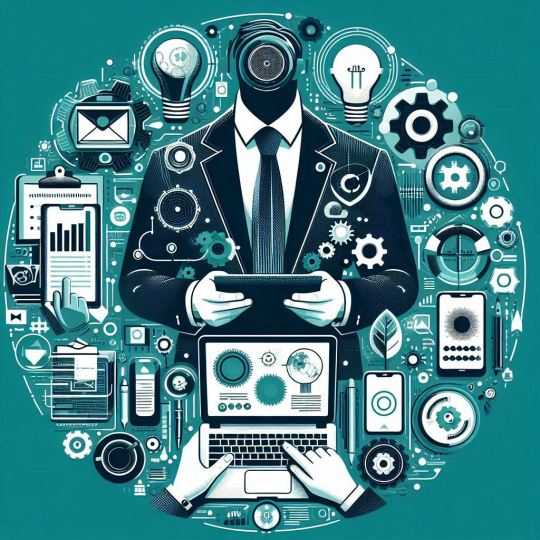
It is a feature-laden project manager that lets you handle tasks, projects, and workflows of all types. Its ease of use and user-friendly interface, complimented with diverse dashboards cater to audiences between small teams and large organizations. Task assignments, time tracking, goal setting, and collaboration options allow you to stop hopping between spreadsheets and emails so your projects are complete efficiently.
2. CRM–– Zoho CRM
Zoho CRM — Your Intelligent Customer Relationships Management System. Among other features, it has lead management, sales automation, and analytics to make sales performance improve on a consistent streamline both administrative aspect as well as customer satisfaction. Due to its integration capabilities with other Zoho products, as well as most third-party applications, It has become a flexible option for businesses that are ready to supercharge their customer relationship management.
3. Accounting: Zoho Books

Zoho Books- The Best Accounting Software for Business Owners Invoicing, expense tracking and financial reporting are some of its features. You can also rest assured that your taxes are being handled correctly and always have the latest view of your financial health to help you manage your finances better.
4. HR Management: monday. com HR
It is a complete human resources management software that helps companies to better structure their workforce. This system provides with facilities like employee on boarding, performance tracking, payroll management etc. With the platform's ease of use, UI simplicity, and automation capabilities in HR processes that would otherwise take hours away from key HR initiatives.
5. Payroll: OnPay
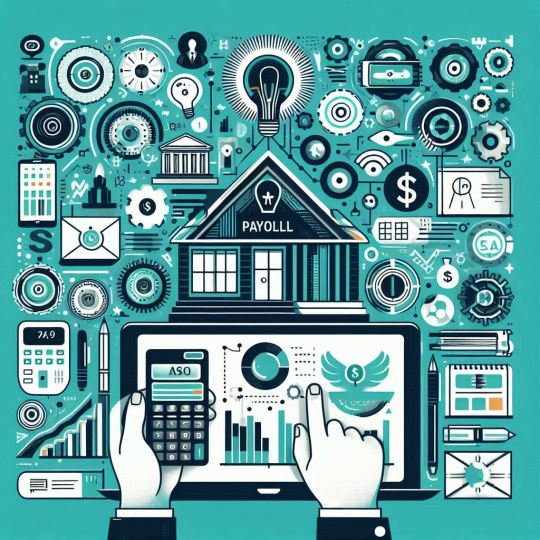
OnPay is an excellent payroll software for businesses of all sizes. It is a cloud payroll software for businesses that ensures complete compliance and automation of top-class payroll calculations, tax filings & employee payments. Additionally, OnPay provides HR and benefits management tools, effectively providing a full-fledged employee pay management solution.
6. Point-of-Sale (POS): eHopper
Versatile Point of Sale Software for Businesses Up To Mid-Sized It offers services like Inventory management, sales tracking and customer management. This makes eHopper a perfect choice for businesses that intend to simplify their sales operations using an affordable and intuitive POS system.
7. Inventory Management: Cin7

While there are plenty of other inventory management systems available, Cin7 stands out as one of the most popular options for small to mid-size businesses (SMBs) looking to get their stock levels, orders and supply chain operations under control. These functionalities consist of real-time inventory monitoring, order processing and e-commerce platform integration. With the powerful feature set of Cin7, businesses can keep inventory at an optimal level and fulfill customer demands to the hilt.
8. Website Builder: Weebly
Weebly is the website builder that you can also use to build your site or blog. It has lots of customizable templates, drag-and-drop functionality, and e-commerce ready to go. With Weebly, you can create a professional website even if you are a tech noob and give your business the relevant online visibility it needs.
9. Recruiting: ZipRecruiter
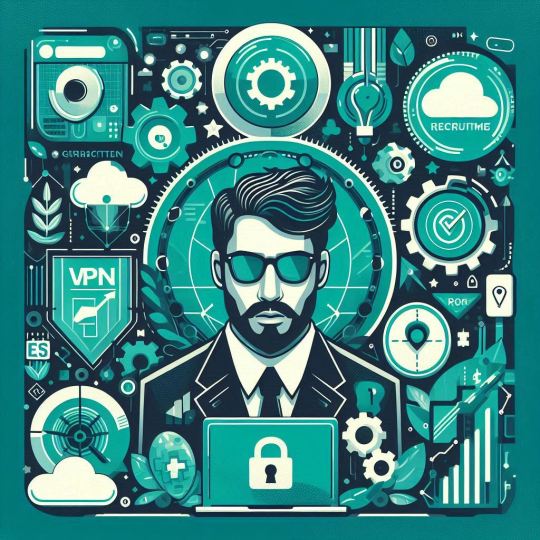
ZipRecruiter: Popular rated job search app for businesses on board. They provide hiring solutions through features like job posting candidates filtering and tracking the application. AI-powered matching from ZipRecruiter surfaces more relevant candidates to businesses faster.
10. VPN: NordVPN
It is a secure, encrypted VPN application that will make sure that you and your business stay safe as you work with the web. It provides features of encrypted connections, threat protection and global server access as well. In this way, It guarantees secure data in companies and privacy on internet.
Conclusion
The business software tools a company uses are very important to increase productivity and power growth. The above-mentioned tools are some of the best & flexible according to the fact which can assist businesses for any sized groups and help them attain their desired objectives. Implementing these tools in your operations can also help speed up processes and lead to higher customer satisfaction, as well as allow you to be on top of the competition.
#business#business growth#innovation#startup#entrepreneur#100 days of productivity#project management#sales#payroll#hr management#hr software#hr services#ai#artificial intelligence#technology#tech#techinnovation
3 notes
·
View notes